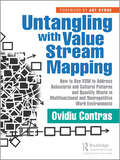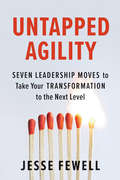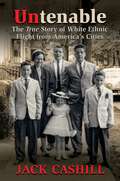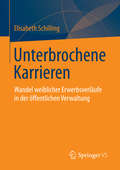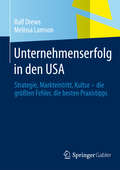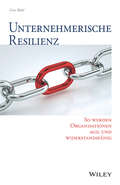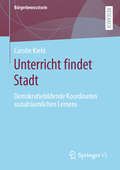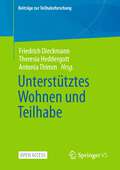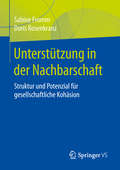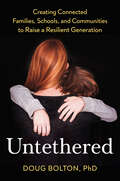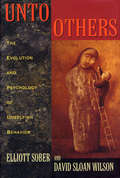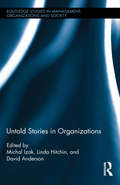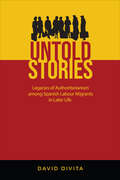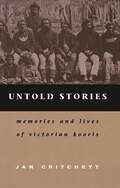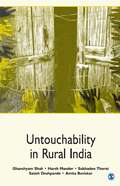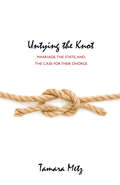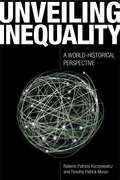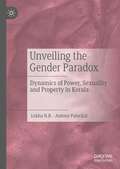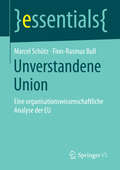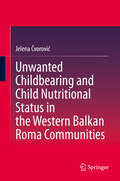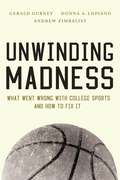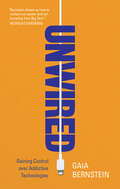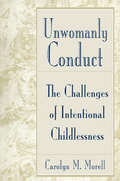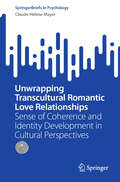- Table View
- List View
Untangling with Value Stream Mapping: How to Use VSM to Address Behavioral and Cultural Patterns and Quantify Waste in Multifunctional and Nonrepetitive Work Environments
by Ovidiu ContrasThe standard belief in books about Lean initiatives and value stream mapping (VSM) is that VSM works well on transactional processes (which are primarily linear processes where handoffs are well defined and the outcome is known) and it is useful for repetitive projects or products. This book counters these statements by clearly demonstrating how a VSM exercise can be successfully performed in complex, multifunctional environments involving nonrepetitive work, such as aircraft new product development, custom engineering, software development and project management. The methodology described in this book is the result of more than ten years of refinement and is based on practice while working with multidisciplinary teams and helping them achieve their goals. This is a novel approach to capturing the information flow in a VSM by recognizing it as the place where most of the issues are generated, especially for the previously mentioned environments and the fact that classical mapping methodologies (including classical VSM) do not capture it well. The VSM methodology that the author developed goes to the essence of a VSM (activities flow, information flow, timeline), uses conventional VSM icons and some custom information flow icons and helps the following: Quantifying waste (VSM literature gap) Making disconnects visible (VSM literature gap) Making behavioral and cultural patterns visible (VSM literature gap) If the steps are followed thoroughly, then lead time reductions ranging from 60% to 88% are achieved, along with increased availability of resources, more output with the same resources, projects delivered on time and, most importantly, colleagues embracing the Lean mindset, which greatly contributes to maintaining the gains.Essentially, this book helps readers perform a VSM in environments where multiple stakeholders interact with each other to deliver a product or a service with unclear aspects, such as what the product/service is, how all involved can contribute to the product or service transformation and how the interactions between them occur. For example, the products/services targeted in this book include test results, analysis results, a custom design, a process, a methodology, an engineering change, integrated enterprise software and engineering drawings.Concurrently, this book helps readers map behavioral patterns, such as micromanagement, and company culture aspects, such as excessive governance and "decisions by committee."
Untapped Agility: Seven Leadership Moves to Take Your Transformation to the Next Level
by Jesse FewellThis balanced guide to agility gets past the hype and frustration to help frustrated leaders transform their agile transformations. Agile transformations are supposed to make organizations modern, competitive, and relevant. But in the well-intentioned effort to move into the future, change leaders find themselves frustrated by pushback, limited impact, poor practices, and unfair criticism. What's going on? Jesse Fewell's book cuts through the "quick-fix" hype of agile theory and explains a recurring transformational pattern that unpacks what holds organizations back. The boost is the initial gains from logical first steps; the barrier is the unavoidable roadblock that must come next; and the rebound is the way forward to further gains by leaning against the concept of the original boost. With these counterintuitive rebounds, Fewell identifies seven leadership moves that can be used to unblock stalled agile transformations. No, your transformation is not a failure. It turns out the buy-in, the talent, the alignment, and the growth you need to break through are already in front of you; it's all simply hidden under the surface—undiscovered, unutilized, and untapped.
Untenable: The True Story of White Ethnic Flight from America's Cities
by Jack CashillLong accused of racism and &“white flight,&” the ethnic Americans driven from their homes and neighborhoods—the author included—finally get the chance to tell their side of the story.&“A startlingly honest and poignant look at &‘white flight&’ from the white perspective. A necessary and overdue corrective.&” —Brent Bozell III, founder and president of the Media Research Center I asked one lifelong friend, a rare Democrat among the displaced, why he and his widowed mother finally left our block in the early 1970s, twenty years after the first African-American families moved in. He searched a minute for the right set of words, and then simply said, &“It became untenable.&” When I asked what he meant by &“untenable,&” he answered, &“When your mother gets mugged for the second time, that&’s untenable. When your home gets broken into for the second time, that&’s untenable.&” In researching this project, I found myself repeatedly stunned by the failure of self-described experts on white flight to ask those accused of fleeing why it was they fled. The reason the experts didn&’t ask, I discovered, is that they were afraid of what they might learn.
Unterbrochene Karrieren
by Elisabeth SchillingDas Buch analysiert, wie Beschäftigte der öffentlichen Verwaltung mit unterbrochenen Erwerbsverläufen ihr Arbeitsleben gestalten, welche Bedeutung Partizipation in der Arbeitswelt für sie hat, wie sie beruflichen Erfolg definieren und die Balance zwischen dem Beruflichen und dem Privaten herstellen. Der Analyse liegt eine qualitative Studie mit biographischen Interviews zugrunde. Frauen erzählten über ihre Erfahrungen des Aus- und Wiedereinstiegs, über ihre Wünsche, Hindernisse auf dem Weg zur Verwirklichung dieser Wünsche und Realitäten im Arbeitsalltag. Durch die Vorstellung der Typologie von Übergangserfahrungen werden diese Erkenntnisse systematisiert und für den Leser greifbar gemacht. Zum Schluss werden Vorschläge für spezifische Personalentwicklungsmaßnahmen gemacht.
Unternehmenserfolg in den USA
by Ralf Drews Melissa LamsonDie USA ist nach wie vor die erste Anlaufstelle für europäische Investoren und wird dies auch in Zukunft bleiben. Obwohl viele Firmen dies erkannt haben, zeigt eine Studie, dass 70% aller Auslandsinvestitionen scheitern - zumeist aufgrund von Fehlkommunikation und mangelndem kulturellen Verständnis. In ihrem Buch bringen Ralf Drews und Melissa Lamson die Bedürfnisse US-amerikanischer Kunden mit europäischen Go-to-Market-Strategien zusammen. Sie vermitteln anschaulich, wie die US-amerikanische Kultur das Geschäftsleben und damit Entscheidungsprozesse, Kaufinteresse und Kundenloyalität beeinflusst. Abgeleitet aus Interviews mit Managern führender europäischer Unternehmen mit Tätigkeitsfeldern in den USA, bietet das Buch zahlreiche praktische Tipps und Erkenntnisse. Darüber hinaus werden Umsetzungstools, wie das US Buying-Decision Model (tm), das Organizational Readiness Survey (tm) und das Go-To Market Decision Diamond Tool (tm) vorgestellt. Vielen europäischen Manager, die auf dem US-amerikanischen Market aktiv werden wollen, ist nicht bewusst, wie groß ihre Wissenslücke eigentlich ist. Dieses Buch hilft Ihnen ihre Lernkurve erheblich zu verkürzen!
Unternehmerische Resilienz: So werden Organisationen agil und widerstandsfähig
by Uwe RühlWas bedeutet es für ein Unternehmen, wenn seine Lieferkette durch eine Naturkatastrophe oder durch Krieg dauerhaft unterbrochen wird? Was passiert, wenn das zentrale Bürogebäude über Nacht abbrennt? Wenn eine Cyberattacke die IT lahmlegt oder ein Shitstorm das Image zu schädigen droht? Und wie sieht eine vernünftige Prävention, wie sehen schlagkräftige Reaktions- und Krisenmanagementmuster aus, die die Handlungsfähigkeit in einer solchen Krise schnell wiederherstellen und gewährleisten? Unter diesen Voraussetzungen vollzieht sich unaufhaltsam der Shift eines in der Psychologie für Individuen seit mehr als zehn Jahren präsenten Mega-Trends in Richtung Unternehmen und Organisationen: Resilienz ist gefragt! Doch das komplexe Wesen von Unternehmen verbietet einen abziehbildartigen Transfer der in der individuellen Psychologie genutzten Resilienz-Prinzipien. Lösungsansätze für diese Herausforderung liegen nur zum Teil in der Normenwelt, mit der Gesetzgeber und befugte Institutionen das Business Contuinity Management, die Cyber Security, Qualitätsstandards und ein funktionierendes Krisenmanagement in Wirtschaft und Business verankern möchten. Hier kommen Uwe Rühl und sein Team mit ihrem Buch ins Spiel: Als Normenexperten wissen sie, wie wichtig ein tragfähiges und starkes "Skelett" für einen resilienten Körper ist. Und als Katastrophenschützer, Leitstellenchef und gestandener Krisenmanager hat Uwe Rühl gelernt, dass es essenziell ist, unter Druck im Ernstfall mit viel Kraft und Flexibilität gut trainierte Muskeln spielen lassen zu können sowie den "Unternehmenskörper" schon im Vorfeld gegen mögliche Risiken zu impfen und so eine Immunisierung in die Wege zu leiten. Organisationale Resilienz ist kein Hexenwerk, sondern hat vielmehr mit solidem Handwerk zu tun. Das Buch vermittelt dieses Handwerk auf der Basis einer gelungenen Symbiose zwischen den Anforderungen der Normen- und Managementsystemwelt und ganz praktischen Ansätzen und Tipps, die "das Fleisch an den Knochen" geben und darauf abzielen, das starre Skelett zu einem agilen und widerstandsfähigen Körper zu machen. Geschichten aus der Berater- und Unternehmenspraxis, Tipps, Tricks und Handlungsempfehlungen aus Uwe Rühls "Leitstellen-Toolbox" sowie plakative Exkurse zum Thema Krisenhandwerk machen das Buch zu einer äußerst nützlichen und spannenden Lektüre.
Unterricht findet Stadt: Demokratiebildende Koordinaten sozialräumlichen Lernens (Bürgerbewusstsein)
by Carolin KiehlDas vorliegende Buch untersucht das Verhältnis zwischen demokratiebildendem Lernen und sozialräumlichen Spezifika im Kontext einer Gesellschaft der Vielfalt. Ausgehend vom Verständnis einer reflexiven, heterogenen und zu Teilen widersprüchlichen Gesellschaft werden fächerübergreifende Kompetenzen erhoben, welche als Facetten von Mündigkeit verstanden werden können. Dabei wird der Begriff des "Sozialraums" über das Quartierverständnis hinaus erweitert als relationaler Raum und figurativer Ausschnitt von Gesellschaft beschrieben. Im Bewusstsein einer lebensweltnahen Demokratiebildung entwickelt sich der Sozialraum dabei zum Koordinatensystem, aus welchem sich Gütekriterien, fördernde, aber auch hemmende Faktoren eines demokratiebildenden, sozialräumlichen Unterrichts ableiten lassen. Ausgehend von Prozessen der produktiven Realitätsverarbeitung und einer Theorie reflexiver Modernisierung wird Lernen als reflexiver und bewusster Vorgang im Verhältnis von innerer und äußerer Realität sowie im Kontext von Wissen und Nicht-Wissen untersucht. Die Analyse gibt Empfehlungen für verschiedene Fachdidaktiken, beschreibt sozialräumliches Lernen jedoch zugleich als reflektierenden Sozialisationsprozess, der zwar in Schule Verankerung findet, aber zugleich für ein lebenslanges Lernen außerhalb des schulischen Sozialraums spricht.
Unterstütztes Wohnen und Teilhabe (Beiträge zur Teilhabeforschung)
by Friedrich Dieckmann Theresia Heddergott Antonia ThimmDas Buch fasst die Forschung zum unterstützten Wohnen und zur Teilhabe von Menschen mit intellektueller Beeinträchtigung zusammen und weist Richtungen für die inhaltliche und methodische Weiterentwicklung. Im ersten Teil wird die Forschung zum Wohnen mit Unterstützung in der Teilhabeforschung verortet und ein Überblick über die Entwicklung und den Stand der deutschsprachigen und internationalen Wohnforschung gegeben. Der zweite Teil setzt mit der partizipativen Forschung und der Zusammenstellung internationaler standardisierter Erhebungsinstrumente forschungsmethodische Impulse. Im dritten Teil werden innovative Themenfelder (Sozialraum, Organisationskultur, technisch unterstützte Teilhabe, Menschen mit komplexem Unterstützungsbedarf) mit ihren Erkenntnissen und Herausforderungen vorgestellt.Dies ist ein Open-Access-Buch.
Unterstützung in der Nachbarschaft: Struktur und Potenzial für gesellschaftliche Kohäsion
by Sabine Fromm Doris RosenkranzErstmals in Deutschland wird hier eine Studie vorgelegt, die Strukturen, Bedingungen und Potenziale informeller – privater – nachbarschaftlicher Unterstützungen detailliert und repräsentativ für eine Kommune untersucht und darüber hinaus ihr Potenzial für soziale Kohäsion analysiert. Es zeigt sich, dass informelle nachbarschaftliche Unterstützung weit verbreitet ist bzw. ein großes Potenzial dafür existiert. Gleichzeitig wird deutlich, dass sie weder andere private Netzwerke ersetzt, noch sich sozialplanerisch einfordern lässt. Unterstützung in der Nachbarschaft stellt vielmehr eine eigenständige Dimension des Sozialen dar – und eine Komponente gesellschaftlicher Kohäsion.
Untethered: Creating Connected Families, Schools, and Communities to Raise a Resilient Generation
by Doug Bolton Ph.D.An essential guide to restoring our children&’s behavioral health and wellbeingOver the past decade, children&’s mental health challenges have reached epidemic levels—stress, anxiety, childhood depression, and suicide are at unprecedented high rates. Amid high-stakes pressure for kids to succeed, parents and teachers have never needed a road map to healthy child development more urgently. And as psychologist and educator Doug Bolton explains in this eye-opening and powerful guide, underlying our modern-day stresses is an even more pervasive problem: We&’re relying on practices that are not in line with what science tells us about how to truly motivate children and help them thrive.As Bolton persuasively argues, we need to step away from parenting and teaching based on controlling our children with incentives and punishments—they focus on short-term compliance at the cost of health development. Instead, creating healthy and strongly bonded communities for our children, both in our own families and in our schools, is key to their emotional well-being, and their success in life. Untethered offers tools to help us create these communities so our kids develop healthy attachments and learn emotional regulation, helping them feel more connected, less anxious, more included, less shamed, and more securely grounded. The power of communities is not only that they enhance our wellness—they buffer us from the impact of trauma and can be a guiding force in helping kids develop resilience.Weaving in Bolton&’s own experiences as a former principal at a therapeutic school and as a father, Untethered is a deeply empathetic and powerful guide to combating the isolation we see in this generation today, leading them toward a healthier, more interconnected future.
Until We Are Strong Together: Women Writers In The Tenderloin (Language And Literacy Ser.)
by Caroline HellerIn her extraordinary book about the members of the Tenderloin Women Writers Workshop, Caroline Heller witnesses the power of literacy in the lives of these women who gathered weekly in one of San Francisco's roughest neighborhoods, to share their writing and life experiences. In telling their stories as she came to know them during her three years of attendance. Heller brings the group to life and explores the functions the workshop served for its participant, functions that were social, political, and deeply educational. Her eloquent narrative contributes a fresh conception of critical literacy and liberation education, drawing on the words and perceptions of some of those outside the mainstream of American life, enriching our understanding of how we might more effectively learn in community with one anothe, and how to connect writing to real life, to our neighborhood, and to social justice and social change.
Unto Others: The Evolution and Psychology of Unselfish Behavior
by David Sloan Wilson Elliot SoberNo matter what we do, however kind or generous our deeds may seem, a hidden motive of selfishness lurks—or so science has claimed for years. This book, whose publication promises to be a major scientific event, tells us differently. In Unto Others philosopher Elliott Sober and biologist David Sloan Wilson demonstrate once and for all that unselfish behavior is in fact an important feature of both biological and human nature. Their book provides a panoramic view of altruism throughout the animal kingdom—from self-sacrificing parasites to insects that subsume themselves in the superorganism of a colony to the human capacity for selflessness—even as it explains the evolutionary sense of such behavior. Explaining how altruistic behavior can evolve by natural selection, this book finally gives credence to the idea of group selection that was originally proposed by Darwin but denounced as heretical in the 1960s. With their account of this controversy, Sober and Wilson offer a detailed case study of scientific change as well as an indisputable argument for group selection as a legitimate theory in evolutionary biology. Unto Others also takes a novel evolutionary approach in explaining the ultimate psychological motives behind unselfish human behavior. Developing a theory of the proximate mechanisms that most likely evolved to motivate adaptive helping behavior, Sober and Wilson show how people and perhaps other species evolved the capacity to care for others as a goal in itself. A truly interdisciplinary work that blends biology, philosophy, psychology, and anthropology, this book will permanently change not just our view of selfless behavior but also our understanding of many issues in evolutionary biology and the social sciences.
Untold Stories in Organizations (Routledge Studies in Management, Organizations and Society)
by David Anderson Michal Izak Linda HitchinThe field of organizational storytelling research is productive, vibrant and diverse. Over three decades we have come to understand how organizations are not only full of stories but also how stories are actively making, sustaining and changing organizations. This edited collection contributes to this body of work by paying specific attention to stories that are neglected, edited out, unintentionally omitted or deliberately left silent. Despite the fact that such stories are not voiced they have a role to play in organizational analysis. The chapters in this volume variously explore how certain realities become excluded or silenced. The stories that remain below the audible range in organizations offer researchers an access to study political practices which marginalise certain organisational realities whilst promoting others. This volume offers a further contribution by paying heed to silence and the processes of silencing. These silences influence the choice of issues on organisational agendas, the choice of audience(s) to which these discourses are addressed and the ways of addressing them. In exploring these relatively understudied terrains, Untold Stories in Organizations comprises an important contribution to the organizational storytelling space, opening paths for new trajectories in storytelling research.
Untold Stories: Legacies of Authoritarianism among Spanish Labour Migrants in Later Life (Anthropological Horizons)
by David DivitaForgetting about Spain’s civil war (1936–9) and subsequent dictatorship was long seen as a necessary safeguard for the democracy that emerged after General Francisco Franco’s death in 1975. Since the early 2000s, however, public discussion of historical memory has awakened efforts to remember this past through the personal testimonies of Spaniards who experienced it firsthand. Untold Stories expands accounts of twentieth-century Spain by presenting an ethnography of an ignored population: the impoverished men and women who fled Franco’s dictatorship in the 1960s, participating in a wave of labour migration to northern Europe. Now in their eighties, they were born around the time of the civil war and came of age during its repressive aftermath before leaving Spain as young adults. The book features a community of such Spaniards, who gather regularly at a senior centre on the outskirts of Paris. Drawing on concepts from linguistic anthropology, David Divita analyses conversational encounters recorded among the seniors to demonstrate how a turbulent past shapes mundane moments of social interaction in the present. Documenting what is said as well as what is not, Divita reveals through detailed textual analysis how silence can pervade the creation of social meanings – such as belonging, authority, and legitimacy. Untold Stories illuminates the impact of a harrowing historical period on some of Spain’s most marginal citizens in the early years of the dictatorship.
Untold Stories: Memories and Lives of Victorian Kooris
by Jan Critchett'I'm your half-brother and I'm here to stay. This is my home.' With these words Wilmot Abraham sought refuge with his white relations. Wilmot was the best-known Aboriginal in the Warrnambool district of Victoria, a man who maintained the old way of life long after his people were dispossessed. Local farmers spoke of him as 'the last of his tribe'. Few were aware that his father had been a white lad working as a boundary rider on the Western District frontier; and only the Aboriginal community knew that Wilmot had barely escaped with his life from the violent seizure of his mother's people's country. In Untold Stories, Jan Critchett presents a series of moving Aboriginal biographies from the Western District of Victoria, drawing both on the oral tradition of local Koori Elders and on official records. Wilmot's is one of the many untold stories that appear here for the first time. Untold Stories opens our eyes to a number of remarkable individuals who managed to make a life for themselves in the interstices of the society that had dispossessed them. Their long-running battle to maintain their culture and their connection to country, in the face of a regime that seemed bent on denying their humanity, is both humbling and inspiring.
Untouchability in Rural India
by Ghanshyam Shah Satish Deshpande Amita Baviskar Sukhadeo Thorat Harsh ManderThis book is focused and systematic documentation of the incidence and extent of the practice of untouchability in contemporary India. Based on the results of a large survey covering 565 villages in 11 states, it reveals that untouchability continues to be widely prevalent and is practiced in one form or another in almost 80 per cent of the villages. Field data is supplemented by information about the forms of discrimination which Dalits face in everyday life, such as: – The ‘unclean’ occupations open to them – The double burden of Dalit women, who suffer both gender and caste discrimination – The upper-caste violence with which any Dalit self-assertion is met The authors also describe Dalit efforts to overcome deeply entrenched caste hierarchies and assert their right to live with dignity. While the evidence presented here suggests that the more blatant and extreme forms of untouchability appear to have declined, discrimination continues and is most prevalent in the religious and personal spheres. The authors show that the notion of untouchability continues to pervade the public sphere, including a host of state institutions and the interactions that occur within them.
Untying the Knot: Marriage, the State, and the Case for Their Divorce
by Tamara MetzMarriage is at the center of one of today's fiercest political debates. Activists argue about how to define it, judges and legislators decide who should benefit from it, and scholars consider how the state should protect those who are denied it. Few, however, ask whether the state should have anything to do with marriage in the first place. In Untying the Knot, Tamara Metz addresses this crucial question, making a powerful argument that marriage, like religion, should be separated from the state. Rather than defining or conferring marriage, or relying on it to achieve legitimate public welfare goals, the state should create a narrow legal status that supports all intimate caregiving unions. Marriage itself should be bestowed by those best suited to give it the necessary ethical authority--religious groups and other kinds of communities. Divorcing the state from marriage is dictated by nothing less than basic commitments to freedom and equality. Tracing confusions about marriage to tensions at the heart of liberalism, Untying the Knot clarifies today's debates about marriage by identifying and explaining assumptions hidden in widely held positions and common practices. It shows that, as long as marriage and the state are linked, marriage will be a threat to liberalism and the state will be a threat to marriage. An important and timely rethinking of the relationship between marriage and the state, Untying the Knot will interest political theorists, legal scholars, policymakers, sociologists, and anyone else who cares about the fate of marriage or liberalism.
Unveiling Inequality: A World-Historical Perspective
by Roberto Patricio Korzeniewicz Timothy Patrick MoranDespite the vast expansion of global markets during the last half of the twentieth century, social science still most often examines and measures inequality and social mobility within individual nations rather than across national boundaries. Every country has both rich and poor populations making demands--via institutions, political processes, or even conflict--on how their resources will be distributed. But shifts in inequality in one country can precipitate accompanying shifts in another. Unveiling Inequality authors Roberto Patricio Korzeniewicz and Timothy Patrick Moran make the case that within-country analyses alone have not adequately illuminated our understanding of global stratification. The authors present a comprehensive new framework that moves beyond national boundaries to analyze economic inequality and social mobility on a global scale and from a historical perspective. Assembling data on patterns of inequality in more than ninety-six countries, Unveiling Inequality reframes the relationship between globalization and inequality within and between nations. Korzeniewicz and Moran first examine two different historical patterns--"High Inequality Equilibrium" and "Low Inequality Equilibrium"--and question whether increasing equality, democracy, and economic growth are inextricably linked as nations modernize. Inequality is best understood as a complex set of relational interactions that unfold globally over time. So the same institutional mechanisms that have historically reduced inequality within some nations have also often accentuated the selective exclusion of populations from poorer countries and enhanced high inequality equilibrium between nations.
Unveiling the Gender Paradox: Dynamics of Power, Sexuality and Property in Kerala
by Lekha N.B. Antony PalackalBoth nationally and internationally, the south Indian state of Kerala has been an object of study for its matrilineal kinship organization among some communities, as well as its achievements in education, literacy, and life expectancy for women against a weak economic base. Nonetheless, scholars have drawn attention to a paradox in Kerala’s model of development, namely women’s deteriorating social position in Kerala and the rise in violence against women. Against this backdrop, this book explores the intersections of gender, sexuality, marriage, family and kinship as related to the matrilineal Nayar community in Kerala. Chapters unravel the interplay between the triple categories of gender, power and social development as they play out at the micro, meso, and macro levels of society, probing the ways in which Nayar women practice agency. Ultimately, the authors explore how the strength of the Nayar community can be used as a case study toward circumventing the prevailing gender paradox and re-imagine a more liberated, empowered and self-reliant woman not only in Kerala, but in India at large. This book will be of interest to scholars in sociology, gender studies, and development studies, particularly those with a focus on South Asia.
Unverstandene Union: Eine organisationswissenschaftliche Analyse der EU (essentials)
by Marcel Schütz Finn-Rasmus BullMarcel Sch#65533;tz und Finn-Rasmus Bull gewinnen in einer organisationswissenschaftlichen Analyse neue Erkenntnisse #65533;ber die besonderen Organisationsmerkmale der oft als politisches B#65533;ndnis oder Projekt umschriebenen Europ#65533;ischen Union (EU). Hierzu bedienen sie sich eines bew#65533;hrten Strukturansatzes aus der Systemtheorie Niklas Luhmanns und verbinden diesen mit dem Konzept der Metaorganisation. Dargelegt wird, welche erschwerten Bedingungen der Steuerung und Ver#65533;nderung in solchen Organisationen auftreten, deren Mitglieder nicht Individuen, sondern ebenfalls Organisationen sind. Die Autoren zeigen, dass vermeintliche St#65533;rungen und Defizite der organisierten Staatengemeinschaft sich hintergr#65533;ndig als elementare St#65533;rken und Vorz#65533;ge erweisen k#65533;nnen.
Unwanted Childbearing and Child Nutritional Status in the Western Balkan Roma Communities
by Jelena ČvorovićThis book investigates the relationship between maternal investment, unwanted births, and child nutritional outcomes in five poor communities of the Western Balkan Roma. Based on an evolutionary approach, the book directly assesses variability in Roma mothers’ parental care using data from UNICEF Multiple Indicator Cluster Surveys 5 and 6 for the Roma settlements in Serbia, Montenegro, Kosovo, Macedonia, and Bosnia and Herzegovina. The book includes useful information about Roma communities in the Western Balkans and their history and sufferings in the region. It reviews this history against the data on unwanted childbearing globally and in low- and middle-income countries. It addresses concerns related to Roma people's integration into European society, despite their longstanding presence in Europe. The book analyses the existence of health differentials among Roma children themselves, suggesting that some children are especially vulnerable. Therefore, it critically assesses how multiple (levels of) vulnerabilities affect differential Roma parental investment in children. This book is a useful resource for researchers interested in Roma studies, children's well-being, wellbeing of marginal groups, social work and social justice.
Unwinding Madness: What Went Wrong with College Sportsand How to Fix It
by Andrew Zimbalist Gerald Gurney Donna A. LopianoA critical look at the tension between the larger role of the university and the commercialization of college sportsUnwinding Madness is the most comprehensive examination to date of how the NCAA (National Collegiate Athletic Association) has lost its way in the governance of intercollegiate athletics-and why it is incapable of achieving reform and must be replaced. The NCAA has placed commercial success above its responsibilities to protect the academic primacy, health and well-being of college athletes and fallen into an educational, ethical, and economic crisis.As long as intercollegiate athletics reside in the higher education environment, these programs must be academically compatible with their larger institutions, subordinate to their educational mission, and defensible from a not-for-profit organizational standpoint. The issue has never been a matter of whether intercollegiate athletics belongs in higher education as an extracurricular offering. Rather, the perennial challenge has been how these programs have been governed and conducted.The authors propose detailed solutions, starting with the creation of a new national governance organization to replace the NCAA. At the college level, these proposals will not diminish the revenue production capacity of sports programs but will restore academic integrity to the enterprise, provide fairer treatment of college athletes with better health protections, and restore the rights and freedoms of athletes, which have been taken away by a professionalized athletics mentality that controls the cost of its athlete labor force and overpays coaches and athletic directors.Unwinding Madness recognizes that there is no easy fix to the problems now facing college athletics. But the book does offer common sense, doable solutions that respect the rights of athletes, protects their health and well-being while delivering on the promise of a bona fide educational degree program.
Unwired: Gaining Control over Addictive Technologies
by Gaia BernsteinOur society has a technology problem. Many want to disconnect from screens but can't help themselves. These days we spend more time online than ever. Some turn to self-help-measures to limit their usage, yet repeatedly fail, while parents feel particularly powerless to help their children. Unwired: Gaining Control over Addictive Technologies shows us a way out. Rather than blaming users, the book shatters the illusion that we autonomously choose how to spend our time online. It shifts the moral responsibility and accountability for solutions to corporations. Drawing lessons from the tobacco and food industries, the book demonstrates why government regulation is necessary to curb technology addiction. It describes a grassroots movement already in action across courts and legislative halls. Groundbreaking and urgent, Unwired provides a blueprint to develop this movement for change, to one that will allow us to finally gain control.
Unwomanly Conduct: The Challenges of Intentional Childlessness
by Carolyn Mackelcan MorellFirst published in 1994. Routledge is an imprint of Taylor & Francis, an informa company.
Unwrapping Transcultural Romantic Love Relationships: Sense of Coherence and Identity Development in Cultural Perspectives (SpringerBriefs in Psychology)
by Claude-Hélène MayerThis research study explores the interlinkages of three major themes, namely transcultural romantic love relationships (TRLRs), sense of coherence (SOC), and identity development (ID) in individuals who are presently involved in romantic love relationships (RLR) with partners from different cultural or ethnic backgrounds. The study uses a qualitative research design within the hermeneutical interpretative research paradigm, aiming to understand the interlinkages of TRLR, SOC, and ID. Based on purposive and snowball sampling techniques, the study includes 22 participants (12 female and 10 male) between 23 and 68 years of age, from 14 different (self-defined) cultural backgrounds. At the time of the interview, participants had been in TRLRs for at least 6 months to a maximum of 26 years. Data were collected through semi-structured interviews and analysed through content analysis. Qualitative quality criteria and ethical considerations were applied. The findings show that TRLRs are firmly based on relationship qualities, strong feelings, common actions, spirituality, and future orientation. Further, the findings present clear interlinkages between TRLR and SOC, contributing positively to meaningfulness, manageability, and comprehensibility. Finally, TRLRs support SOC on intrapersonal, cultural, and interpersonal levels. In addition, they influence the development of identity awareness, actions, feelings, and sexual SOC. Conclusions, limitations, and recommendations for theory and practice are provided.
